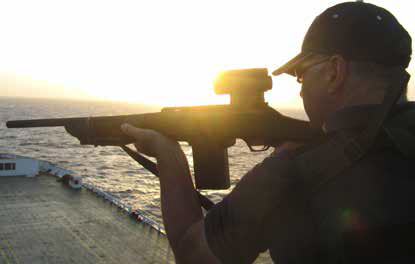The great PMSC retreat

When I was six, I lived with my parents in Mogadishu. It was a delightful place to be a little boy. One day a man with a big black beard and tattoos came to stay in the spare bedroom. He was a Royal Navy petty officer, landed ashore to the hospital with acute appendicitis, rescued, to convalesce after his operation, by my ex-RN father. His ship was on anti-piracy patrol.
Two things we never thought we would see again, some years ago, were wars of religion and private warships. We were wrong on both counts. Wars of religion are doing well, but privateering may soon have had its day.
One large British provider of armed security guards for merchant ships has just gone into liquidation. There are very definite rumours that this company may have been the first, but it almost certainly will not be the last of the armed guard providers to go bust. There are quite a number of self-employed people sitting around with guns with money due to them.
The number of PMSCs (Private Marine Security Companies) in the business has increased, and the perceived risk has decreased.
Shipowners and particularly charterers, faced with lots of competitors, have reacted in the usual way, by haggling the price down, because they no longer expect their ships to be attacked.
At the same time, we have what I might term the ‘anti-vaxxers’ – those shipping companies – particularly some of the large containerlines – who are now running ships through with no armed guards onboard, relying on the pirates assuming that they will have guards, because most ships do.
The effect has been a reduction in the income of the guard companies, whilst their cost structures have been unable to adjust.
I would expect those companies who are operating ships themselves to be the hardest hit, as they have the highest levels of fixed costs. Their ships are often described as ‘escort vessels’ but more often they are actually used as accommodation vessels, for guards and their arms, at each end of the High Risk Zone, thus allowing guards to carry military type weapons, which would not be permitted through customs without military type paperwork, to join and to disembark from ships without going ashore, thus avoiding customs and immigration altogether and saving a fortune in agency costs and hotel bills – provided there are only a few men sitting onboard doing nothing.
Those companies that regularly land their men are carrying less fixed costs and are in a somewhat better position to bend with the wind of fortune. The bigger operations often have other sidelines, like providing personal security for the obscenely rich, both with and without yachts, and they will fall back on those.
We may observe in passing that Parkinson’s Law applies. Bureaucracy expands to fill the space available, and is now so perfect that my company was recently grilled at length, taking a couple of hours of our time, because one guard on one ship, flown out in a hurry as a relief, was missing one bit of paper.
My favourite story of the whole marine security thing will remain the account, given to me, deadpan, by a delightful man, of the ‘security services’ variety, about a Russian oligarch who wished to send his not small yacht through the Red Sea, quite early on in the business. He was able, let us not enquire how, to obtain the services of a Russian warship to accompany his gin palace, and, to ensure that the grey ship stayed close by, he instructed the yacht’s stewardesses to sunbathe topless on the upper deck throughout the transit.
